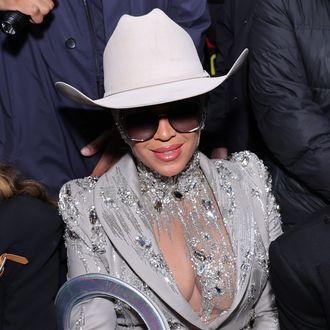
Now that she broke the internet again, Beyoncé is turning toward a more old-fashioned format: the airwaves. Her single “Texas Hold ’Em,” off her upcoming album Renaissance Act II, entered Billboard’s Country Airplay chart at No. 54. It’s a bigger feat than the number implies, considering Beyoncé got there without formally servicing the single to country radio (though her team will be doing that next week), and after only four full days of airplay. With “Texas,” Beyoncé became just the eighth Black woman ever to land on the Country Airplay chart, and the first in nearly a decade since Mickey Guyton did it in 2016. But that’s where the challenge begins — not for Beyoncé as much as country music itself.
Country radio remains one of the most exclusive institutions in music. Unlike pop, where radio has become largely responsive to trends on the internet and TikTok, the airwaves still set the agenda in Nashville. It’s often impossible to break into radio without going through the formalities: servicing a single, plugging it (via a consultant who promotes it to country stations), performing it for Nashville tastemakers. Once you’re in, climbing the charts is an even bigger challenge. Many stations dribble in new music to make sure listeners enjoy it before putting it fully into the rotation, a process that can take weeks or longer. This is a struggle for any artist, but especially one who doesn’t look like other country stars. The peak slot for a Black woman at country radio is still only No. 22, which Linda Martell hit with her timeless take on “Color Him Father” in 1969. By charting at all, Beyoncé has already made it farther than forebears like Ray Charles and Tina Turner. (Charles finally made it to country airwaves more than two decades after his sublime Modern Sounds in Country & Western Music, thanks to a Willie Nelson duet.)
Not that Beyoncé needs country radio in the first place. Unlike previous “carpetbaggers” like Jewel and Kid Rock, she isn’t an outsider turning to the genre to revive a lagging career — she’s at the top of her game, tapping into an interest she’s had since growing up in Houston. Some even wondered if Beyoncé would shun country radio altogether, using her platform to decenter outdated racist and sexist power dynamics. But it is undeniable that a song like “Texas Hold ’Em,” with its twangy banjo riff and hoedown chorus, belongs next to today’s biggest country hits.
For the moment, it’s country radio that seems to want Beyoncé. One of the first stations to play “Texas Hold ’Em” was Nashville’s influential Big 98, and multiple stations in Houston have been spinning both “Texas” and Beyoncé’s other new country single, “16 Carriages.” The biggest dustup so far involved an Oklahoma station insisting it doesn’t play Beyoncé because she’s not country, before immediately adding “Texas” to its playlist upon learning that Beyoncé had actually released a country song. In a statement, executives for iHeartMedia, the largest radio conglomerate in the U.S., said they were “excited” to introduce Beyoncé’s song to “the entire iHeartCountry platform.” The chief content officer of Cumulus Media, another radio company, told Variety the song was “a gift” and “everybody at country wants to play it.”
The question is for how long. Compared to pop, where hits often impact on arrival, country singles regularly take half a year or longer to hit No. 1 on radio. The last song by a Black woman to chart on Country Airplay, Mickey Guyton’s “Heartbreak Song,” bottomed out after just ten weeks; her previous, “Better Than You Left Me,” spun its wheels for half a year only to barely crack the top 40. Part of that can be chalked up to Guyton’s long-documented lack of label support, along with the climate around institutional racism before the 2020 Black Lives Matter protests. In the years since, though, country radio hasn’t changed, denying opportunities to dozens more Black artists, especially Black women. (Even Guyton’s 2021 debut album, nominated for three Grammys, couldn’t break in.)
So when listeners call in to say Beyoncé doesn’t belong in the genre, will stations give them time to come around or pull the song? Will they give her single even a fraction of the attention of a new one by Luke Combs or Morgan Wallen? Will Beyoncé be hurt by outdated ideas around how often a station can play a song by a woman? Country radio has bluffed on equity before, but it’s never had more people waiting to call it on it.


